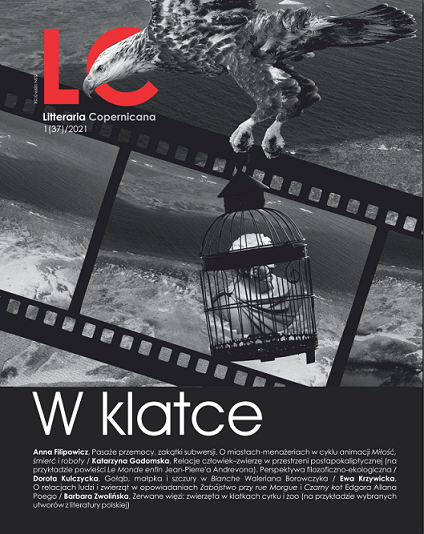Relacje człowiek–zwierzę w przestrzeni postapokaliptycznej (na przykładzie powieści "Le Monde enfin" Jean-Pierre’a Andrevona). Perspektywa filozoficzno-ekologiczna
DOI:
https://doi.org/10.12775/LC.2021.002Słowa kluczowe
zwierzę, natura, Antropocen, ekologia, fantastyka, Animal, nature, Anthropocene, ecology, fantastic literatureAbstrakt
Celem artykułu jest ukazanie specyfiki relacji człowiek/zwierzę w postapokaliptycznej przestrzeni w Le Monde enfin Jean-Pierre’a Andrevona, powieści stworzonej pod wpływem niektórych idei filozofii spekulatywnej i ekologii głębokiej. Artykuł zakłada zanalizowanie dwóch faz, które wpływają na kształtowanie się relacji między ludźmi i zwierzętami: upadku antropocentrycznego świata oraz początku nowego świata z prymarną rolą natury. Zwierzęta i rośliny rekolonizują Ziemię czyniąc ostatnich przedstawicieli rasy ludzkiej więźniami w tropikalnych labiryntach miast – dawnych symboli wielkości człowieka. W dalszej analizie zostają omówione zjawiska widoczne w drugiej fazie: inwersja pojęć człowiek – zwierzę oraz postawa „humanizmu bez ludzi”. Konkluzja dowodzi, iż powieść zaprasza do redefinicji granic człowieczeństwa i zwierzęcości, zaś jej struktura, przyjęta optyka narracyjna oraz dystrybucja ról aktancjalno-tematycznych uwypuklają koniec Antropocenu i początek nadrzędnej roli natury.
The aim of this article is to present the characteristics of the human-animal relations in the post-apocalyptic world of Jean-Pierre Andrevon’s Le Monde enfin, a novel influenced by certain concepts derived from speculative philosophy and deep ecology. The article analyzes the two phases that impact the shaping of relationships between humans and animals: the fall of the anthropocentric world and the beginning of the new world, wherein the role of nature is primary. Animals and plants recolonize the Earth and trap the last members of the human race in the tropical mazes of cities – the ancient symbols of human greatness. Further analysis involves discussing the phenomena visible in the second phase: an inversion of the notions of “human” and “animal” and the attitude of “humanism without people”. The conclusion proves that the novel invites us to redefine the limits of “human” and “animal”. Its structure, the adopted narrative strategy and the distribution of actantial and thematic roles highlight the end of human domination, as well as the beginning of the supreme role of nature.
Bibliografia
Andrevon, Jean-Pierre 1980. Przedmowa do antologii. L’oreille contre les murs. Paris: Denoël.
Andrevon, Jean-Pierre 2006. Le Monde enfin. Paris: Fleuve Noir.
Bachelard, Gaston 1961. La Poétique de l’espace. Paryż: PUF.
Baratay, Eric 2012. Le Point de vue animal, une autre version de l’histoire. Paris: Seuil.
Brassier, Ray 2007. Nihil Unbound: Enlightenment and Extinction. London: Palgrave, Macmillan.
Chmurzyński, Jerzy Andrzej 1990. „Natura – kultura: opozycja czy koniunkcja?”. Kosmos 39 (I): 77–96.
Gadomska, Katarzyna 2019. „Le néofantastique et la philosophie dans Le Monde enfin de Jean-Pierre Andrevon”. Kwartalnik Neofilologiczny LXVI, 3: 460–470.
Goimard, Jacques 2002. Critique de la science-fiction. Paris: Pocket.
Greimas, Algirdas 1966. La Sémantique structurale. Paris: Larousse.
Harman, Graham 2010. L’Objet quadruple: Une métaphysique des choses après Heidegger. Paris: PUF.
Ibrahim, Marwa 2014. „Le Monde enfin de Jean-Pierre Andrevon: un récit humaniste sur la fin de l’Homme”. ReS Futurae 4. Publikacja on-line: http: //journals.openedition.org/resf/551.
King, Stephen 1995. Anatomie de l’horreur. Tłum. J.-B. Brèque. Paris: Editions du Rocher.
Lagoguey, Hervé 2014. „Les verts horizons de Jean-Pierre Andrevon, pilier de la Terre au coeur de la science-fiction francophone”. Eidôlon 111: 23–34.
Leopold, Aldo 2013. A Sand County Almanac and Other Writings on Ecology and Conservation. New York: Library of America.
Malrieu, Joël 1992. Le Fantastique. Paris: Hachette.
Metzinger, Thomas 2013. Spirituality and Intellectual Honesty. An Essay. Johannes Gutenberg-Universität Mainz Blogs. On-line: http: //www.blogs.uni-mainz.de.
Sugiera, Małgorzata 2018. „Imiona Gai. Myśląc o końcu Antropocenu”. Prace kulturoznawcze 22: 1–2.
Taylor, Paul W. 1986. Respect for Nature: A Theory of Environmental Ethics. Princeton: Princeton University Press.
Thacker, Eugene 2010. In The Dust of This Planet (Horror of Philosophy). Vol. I. Washington: Zero Books.
Van Herp, Jacques 1973. Panorama de la science-fiction. Verviers: Marabout
Vax, Louis 1970. L’Art et la littérature fantastiques. Paris: PUF.
Weil, Kari 2012. Thinking Animals – Why Animal Studies Now?. New York: Columbia University Press.
Pobrania
Opublikowane
Jak cytować
Numer
Dział
Statystyki
Liczba wyświetleń i pobrań: 622
Liczba cytowań: 0



